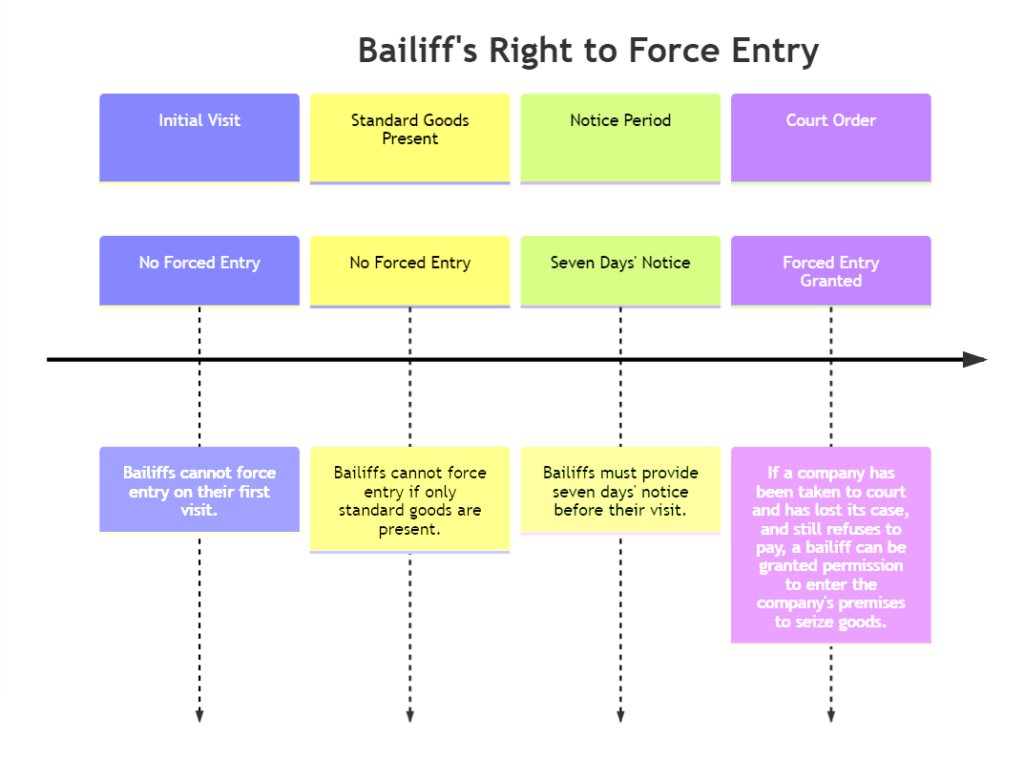In the world of business, financial ups and downs are inevitable. There may come a time when a company faces debt, and dealing with bailiffs becomes a reality. One question that often arises in such scenarios is, “Can a bailiff force entry?” This article aims to provide a comprehensive answer to this question, specifically tailored for companies and their directors.
Quick Links
Understanding the Role of a Bailiff
Before we delve into the specifics, it’s crucial to understand who a bailiff is and what they do. A bailiff is a legal officer who has the authority to collect debts on behalf of creditors. Their role may involve seizing goods, serving legal documents, or repossessing property. However, their powers are not unlimited, and there are specific rules they must follow.
Can a Bailiff Force Entry into a Company’s Premises?

- Initial Visit: On their first visit, bailiffs cannot force entry into a company’s premises. This is in accordance with the Tribunals, Courts and Enforcement Act 2007, Schedule 12, Paragraph 17.
- Standard Goods: If only standard goods are present, bailiffs cannot force entry. This is to prevent unnecessary disruption to the business.
- Notice Period: Bailiffs must provide seven days’ notice before their visit. This gives the company time to prepare or seek advice.
- Court Order: If a company has been taken to court, lost its case, and still refuses to pay, a bailiff can be granted permission by the court to enter the company’s premises to seize goods. This is a last resort and is governed by the Tribunals, Courts and Enforcement Act 2007, Schedule 12, Paragraph 18.
It’s important to note that the rights and powers of a High Court Enforcement Officer (HCEO) differ slightly from those of other bailiffs. HCEOs have the power to enforce High Court writs, including the writ of control, which is commonly used to enforce the payment of a judgment debt. They can force entry into commercial premises if they believe the debtor’s goods are inside and it’s a peaceful entry (through an unlocked door, for example).
Remember, it’s always advisable to seek legal advice if you’re dealing with bailiffs. Understanding your rights and the legal framework can help you navigate this challenging situation.
Rights and Responsibilities of Company Directors
Rights
- Right to See Bailiff’s ID: Company directors have the right to ask the bailiff to show their identification. This can include a badge, ID card, or certificate, which should include their name and who they work for.
- Right to See the Court Order: Directors have the right to see a copy of the court order that gives the bailiff the authority to visit the company’s premises. This order should detail the amount of debt owed.
- Right to a Breakdown of the Owed Amount: Directors can request a detailed breakdown of the debt. This should include the original debt amount, any added interest or charges, and any payments already made.
- Right to Peaceful Enjoyment: Under the Human Rights Act 1998, everyone has the right to peaceful enjoyment of their possessions. This means bailiffs should carry out their duties in a way that respects this right.
- Right to Legal Representation: Directors have the right to seek legal advice at any stage of the process. If a bailiff is acting outside of their powers, legal representation can help protect the company’s rights.
Responsibilities
- Responsibility to Cooperate: Directors have a responsibility to cooperate with bailiffs. This includes providing them with the necessary information and not misleading or deceiving them.
- Responsibility Not to Obstruct Bailiffs: It’s important that directors do not physically obstruct bailiffs from carrying out their duties. This could lead to further legal consequences.
- Responsibility to Comply with Court Orders: If a court order has been issued, directors have a responsibility to comply with it. This includes allowing bailiffs to enter the premises if the court order permits it.
- Responsibility to Pay Debts: Ultimately, directors have a responsibility to pay any debts the company owes. If a bailiff is visiting because of unpaid debts, it’s a sign that the company needs to take action to address its financial situation.
Dealing with Bailiffs: Best Practices for Companies
When dealing with bailiffs, communication is key. Inform your employees about the situation and instruct them on how to interact with bailiffs. Keep a record of all interactions with the bailiff, including dates, times, and what was discussed. If you believe a bailiff has overstepped their boundaries, seek legal advice immediately. If you are concerned about whether a bailiff is genuine, you can check their details on the certified bailiff register.
In conclusion, while a bailiff can force entry into a company’s premises, they can only do so under specific circumstances and must follow certain rules. As a company director, understanding these rules can help protect your company’s rights and navigate the debt recovery process more effectively.
If you are a company director having difficulties with bailiffs or are struggling to repay company debts, please contact us here at Company Doctor today. We are an established insolvency practice with our own licensed Insolvency Practitioner. We specialise in various s debt and insolvency solutions such as a Creditors Voluntary Liquidation or business recovery such as Administration and Company Voluntary Arrangements.
Freephone including all mobiles
FAQs
Can bailiffs break into commercial property?
Bailiffs can gain entry into a commercial property, but only under specific circumstances. They must have a court order that grants them permission, and they must have given seven days’ notice of their intent to visit. It’s important to note that they cannot use force on their initial visit unless they are collecting unpaid fines, tax debts, or have a warrant to seize goods inside.
Can you physically stop a bailiff?
Physically preventing a bailiff from carrying out their duties is not advisable and could lead to legal repercussions. It’s better to understand your rights and communicate effectively with the bailiff or seek legal advice if you believe they are acting outside their powers.
Can I refuse a bailiff entry?
Yes, you can refuse a bailiff entry into your premises. However, if they have a court order and have given the required notice, they can take steps to gain entry. It’s always better to engage with them and try to resolve the issue rather than outright refusal, which could escalate the situation.
Can a bailiff take personal items for a limited company debt?
Bailiffs collecting a debt for a limited company can only take control of goods owned by the company. They cannot take personal items belonging to directors or employees unless those items are also owned by the company. If you believe a bailiff has wrongly taken personal items, you should seek legal advice.
References
The primary sources for this article are listed below.
Certificated Bailiff Register – Justice UK
Tribunals, Courts and Enforcement Act 2007 (legislation.gov.uk)
Details of our standards for producing accurate, unbiased content can be found in our editorial policy here.

